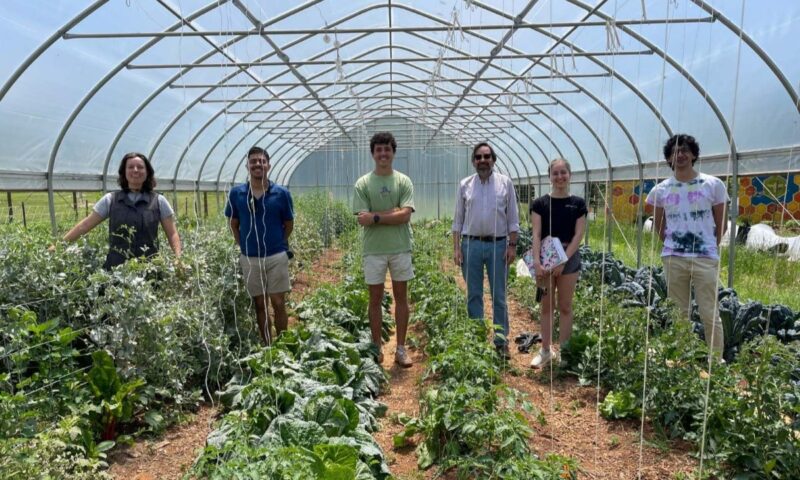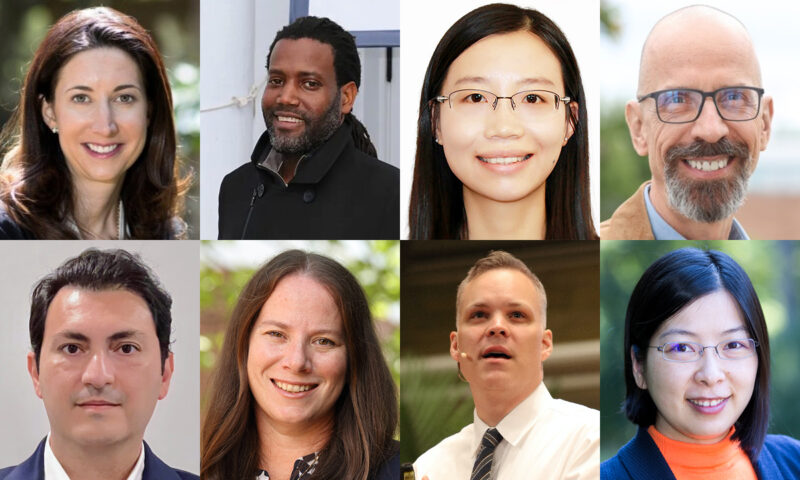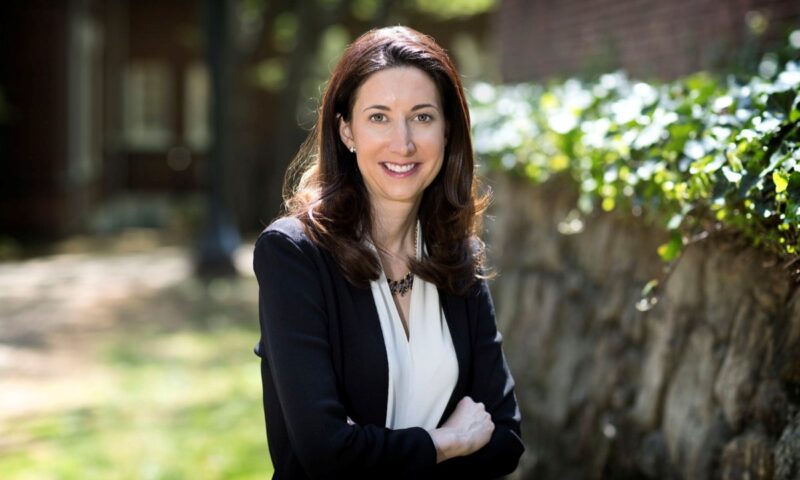With all that’s been going on in the world the past few years, it’s difficult to imagine that a better life for everyone could be on the horizon. Zack Kass, former Go-to-Market Lead at OpenAI who spent 14 years in artificial intelligence, says that kind of transformation is within the realm of possibility. But he’ll be the first to admit that achieving it won’t be easy.
Serving as the keynote at McIntire’s Fall Forum, “The AI Revolution: Exploring Possibilities & Challenges,” on Oct. 20, 2023, Kass explained that the world is not prepared for what’s coming. And though his point of view stands in direct opposition to a prevailing narrative in the media—that AI is inherently bad, and if not purposefully out to get us, then at least so unnatural in its abilities that it will prove be to humankind’s detriment in the long run—he presented an honest exploration about the potential for societal advancement as well as the possible dangers that may come with such upheaval.
In his talk, “Towards AGI,” (artificial general intelligence, a theory that AI may reach the point where it conceives of scientific developments on its own), he provided a wealth of incredible theories for the audience at Old Cabel Hall to consider. Kass’s keynote was followed by a discussion moderated by Professor Steven L. Johnson that included insights from panelists Kent Collier (McIntire ’03), Founder and CEO of intelligence, data, and analysis firm Reorg; Professor Sarah Lebovitz; and Professor Dorothy Leidner. After the event, Kass took time to meet with a group of McIntire’s undergraduate and graduate students to continue the conversation over lunch.
Here are five significant ideas on AI that stood out from the Fall Forum—and may stand to shape our future.
- We are on the verge of the most profound industrial revolution in human history.
Kass was emphatic that all of the technological advances defining the human experience—from the aqueduct to the internet—will pale in comparison to what a properly executed AI revolution could do for our world. He insists that we are on the verge of an acceleration that allows for nearly impossible-to-conceive-of advancement, which he likens to attempting to explain the internet to a caveman or even someone from 1900. The thought experiment Kass asked the audience to consider was intended to show how difficult it would be for us to comprehend a discovery from 50 to 100 years in the future that someone might try to explain to us now, and how it requires us to suspend some belief. While he acknowledges that there is a sizeable group who believe that the changes will not be so rapid or extreme, Kass insists we recognize that we are early in the journey with AI and still climbing on the J-curve of what is possible.
- The AI revolution doesn’t come without risks.
Like all major changes, the disruption that AI is poised to cause could also usher in some very difficult and unpleasant outcomes as byproducts of what it may provide.
Kass says that arrested mental development could occur from having so many menial tasks taken away from us. He points to the mindless “doom scrolling” and hours people are already throwing away on social media and platforms like TikTok as the type of blind consumption that could be possible if we eventually allow AI to tackle so much of our lives.
A second and very real possibility, one that probably garners the most concern, is job displacement. While he believes AI can serve as a tool to help people with their day-to-day responsibilities at work, he has no doubt that AI will replace humans at particular jobs—and that it will be widespread, affecting a sizeable portion of society.
During the panel discussion, Leidner touched on the subject, mentioning the “tremendous changes” that often take place over the course of 25 years. She feels that we’ll see the same sizeable shift in labor in the 25 years ahead—much of which will be driven by AI.
“There will be jobs we didn’t even think about and don’t have a title for today that will exist 25 years from now, and there are jobs that people do today that won’t exist. But to be human is to innovate, but also to be human is to be resilient,” she says. “We’ll be finding ways to use AI to make our lives better, to make our work better, and to make our world better.”
Another risk of AI advancement and adoption is widespread disinformation, which has been impacting news and social media for years. Kass believes it will get worse before it is controlled through countermeasures.
The last major risk is an existential one—an alignment problem of training machines how to be fully cognizant of the human condition. Kass notes that, despite dystopian fantasies about AI becoming evil and overtaking humanity, leaders in the field are focused on alignment to make AI better understand nuance.
Natalie Kim (McIntire ’24) found the question significant: “It was very impactful to hear that the biggest challenge in the universal acceptance of AI is the question of ‘Can we train a machine to care about the human condition?’” She says that the Fall Forum keynote taught her how keen creators of AI are to prove that their product meets that human threshold before they launch it for public use.
- Technology doesn’t inevitably bring progress.
Computers are getting smaller and faster and have been for decades. Yet Kass says that, despite the potential advances in the works, running AGI or AI models will require us to overcome a deficit in computational power, an obstacle that could halt progress for an indeterminate amount of time. And running those computers is also a problem, as we face a huge energy deficit, with AI potentially causing more ecological problems.
The irony, Kass says, is that AGI could potentially solve those environmental problems, but we still need to achieve those benchmarks efficiently.
The third roadblock to progress that concerns Kass the most is government policy. While he believes that AI should be regulated, he says that government should assist the private sector to adopt AI safely and responsibly in advance of passing policy, while including the private sector in the conversation to inform government about how the technology is improving and impacting their constituents.

- AI has the capacity to reduce suffering and will dramatically change our lives in the next 20 years.
The more uplifting possibilities of AI that may lie ahead will come in the areas of science, productivity, healthcare, education, and a plummeting cost of instituting AI.
Kass was noticeably excited when he spoke about the potential for scientific breakthroughs that could cure diseases from Alzheimer’s to cancer, saying that AGI could function with the power of millions of oncology researchers at the medical community’s fingertips. He adds that energy abundance is also a possible advancement that AI could unlock.
Alluding to massive occupation turnover, he also believes that worker productivity and overall job satisfaction will increase. Most bureaucratic and repetitive tasks will be taken from us to free us for more engaging and challenging work, he says.
Kim is excited by the prospect. “The idea of having an algorithm compile relevant data sources to support an argument or run a complex data analysis would vastly increase worker productivity by giving more time to explore other routes and options,” she says. “I feel that a large barrier in our current effectiveness in the workplace is not having the time or resources to create and test new solutions that could advance our society.”
Another change involves what are luxuries to many becoming staples for all—particularly in healthcare and education. Jenna Carpenter (McIntire ’23, M.S. in Accounting ’24) was particularly interested in these applications for AI. “Kass foresees an educational environment in which children are allowed more time to play outdoors and build interpersonal and social skills. Then, a lot of formal learning would be led by AI in a tutor/small-group scenario,” she says. “It’s a way to uplift people who historically could not access quality education and help alleviate the teacher shortage.” As for advances in medicine, Carpenter notes that the Fall Forum panelists agreed that AI could be a powerful diagnostic tool, although some were concerned it could potentially slow many areas of medicine, “as doctors using AI to analyze lab results or x-rays almost always double-check and re-run tests due to the risk of Type 2 [false-negative] errors in AI models.”
But she says that during the lunch with Kass, he shared his vision of AI proving to be more beneficial to those who would not ordinarily be able to access any sort of healthcare or make doctor visits.
“Right now, quality education and healthcare are luxury goods. If AI could democratize these areas in the way Zack Kass predicts, that would be transformational for so many people.”
The last change Kass referred to was deflation; he imagines the costs of goods and services dropping, due in large part to automated manufacturing and servicing. During the panel discussion, Collier was emphatic about the topic as well, insisting that not only would the price of instituting AI services go down, but that businesses need to adopt it quickly: “The technology is inherently deflationary; the cost of these knowledge services is effectively going to go to zero. So how do you differentiate yourself? If you’re not all in on AI, you’re dead in three years.”
- We are going to become a whole lot more human.
Lastly, Kass talked about the time that AI will free up, allowing all of us to better understand who we are, what we want, and how we can be more human, opening the door for us to live more meaningful lives. But he suggests that we consider undertaking serious introspection that goes beyond career considerations today.
Despite acknowledging the many dangers along with his fellow panelists, Kass brought an unwavering optimism to the Fall Forum. He implored students to turn their backs on cynicism, keep their minds open, and remain positive about what is possible.
“Try to imagine a future that is abundant and that is bright, because we cannot build one unless we can imagine it,” Kass says.



